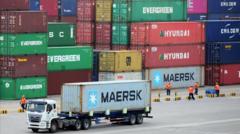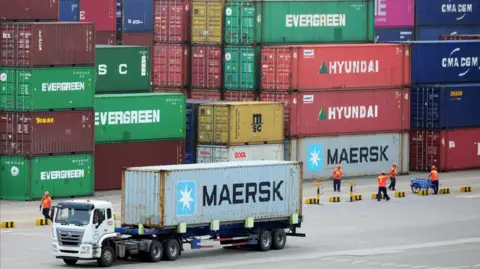This website uses cookies so that we can provide you with the best user experience possible. Cookie information is stored in your browser and performs functions such as recognising you when you return to our website and helping our team to understand which sections of the website you find most interesting and useful.

 Reuters
ReutersDonald Trump says he will hit China, Mexico and Canada with new tariffs on day one of his presidency, in an effort to force them to crack down on illegal immigration and drug smuggling into the US.
The US president-elect said he would sign an executive order imposing a 25% tariff on all goods coming from Mexico and Canada, after being inaugurated on 20 January 2025.
He also said "we will be charging China an additional 10% tariff, above any additional tariffs" until it cracked down on fentanyl smuggling.
The threat could mark a major escalation in tensions with the US's three top trading partners. It could also lead to higher prices for Americans, since tariffs work as a form of tax on imports.
The US is the world's largest importer. China, Mexico and Canada account for about 40% of the $3.2tn (£2.6tn) of goods it imports each year, according to official data.
China has defended its efforts to stop the flow of illegal drugs, and has warned that there can be no winner in a trade war between the two.
After Trump made his tariff threat, he spoke to Canada's Prime Minister Justin Trudeau for about 10 minutes, discussing trade and border security, a Canadian government official told the BBC. They had a "good discussion", the source said.
During the call, Trudeau pointed out that the number of migrants crossing the Canadian border was much smaller compared to the US-Mexico border, the official said.
Mexico's finance ministry said: "Mexico is the United States' top trade partner, and the USMCA provides a framework of certainty for national and international investors."
The measures have the potential to cause disruptions to the global supply chain and would hit the three countries targeted by the tariffs hard.
The tariffs on Mexico and Canada will remain in place until the two countries clamp down on drugs, particularly fentanyl, and migrants illegally crossing the border, Trump said in a post on his Truth Social platform.
"Both Mexico and Canada have the absolute right and power to easily solve this long simmering problem," he wrote. "It is time for them to pay a very big price!"
In a follow-up Truth Social post, Trump attacked Beijing for failing to follow through on promises that he said Chinese officials made to carry out the death penalty for people caught dealing fentanyl, a synthetic opioid.
A spokesperson for the Chinese embassy in Washington told the BBC "the idea of China knowingly allowing fentanyl precursors to flow into the United States runs completely counter to facts and reality".
"China believes that China-US economic and trade cooperation is mutually beneficial in nature. No one will win a trade war or a tariff war," he added.
The Biden administration has been calling on Beijing to do more to stop the production of ingredients used in fentanyl, which Washington estimates killed almost 75,000 Americans last year.
During his election campaign, Trump threatened Mexico and China with tariffs of up to 100%, if he deemed them necessary, much higher than those he put in place during his first term in office.
Trump has also said he will end China's most-favoured-nation trading status with the US - the most advantageous terms Washington offers on tariffs and other restrictions.
Last year, more than 80% of Mexico's exports went to the US, while around 75% of Canada's went to its southern neighbour.
Even after years of a bitter trade dispute between the world's two biggest economies, the US still accounts for about 15% of China's exports.
How do tariffs work?
A tariff is a domestic tax levied on goods as they enter the country, proportional to the value of the import. So a car imported to the US with a value of $50,000 subject to a 25% tariff, would face a $12,500 charge.
Tariffs are a central part of Trump's economic vision - he sees them as a way of growing the US economy, protecting jobs and raising tax revenue.
He has previously claimed that these taxes are "not going to be a cost to you, it’s a cost to another country".
This is almost universally regarded by economists as misleading.
The charge is physically paid by the domestic company that imports the goods, not the foreign company that exports them.
So, in that sense, it is a straightforward tax paid by domestic US firms to the US government.
Trump imposed a number of tariffs in his first term of office, many of which have been kept in place by his successor, President Joe Biden. Economic studies suggest most of the economic burden was ultimately borne by US consumers.
It was not immediately clear whether Trump's "additional 10% tariff, above any additional tariffs" earmarked for China were on top of the 25% he was planning for Canada and Mexico.
What is Trump's strategy?
The move is "clearly consistent with his promise that he made during the campaign to utilise tariffs as a weapon to accomplish many of his policy initiatives," Stephen Roach, Senior Fellow at the Paul Tsai China Center of Yale Law School, told the BBC's Business Today programme.
Trump's pick for Treasury Secretary, Scott Bessent, has previously suggested that the president-elect's threats to impose major tariff hikes were part of his negotiating strategy.
“My general view is that at the end of the day, he's a free trader," Bessent said of Trump in an interview with the Financial Times before he was nominated for the role.
“It’s escalate to de-escalate.”
It comes as the Chinese economy is in a significantly more vulnerable position than it was during the previous Trump presidency.
The country has been struggling with a number of serious issues, including an ongoing property market crisis, weak domestic demand and growing local government debt.
The new tariffs appear to break the terms of the US-Mexico-Canada Agreement (USMCA) on trade.
The deal, which Trump signed into law, took effect in 2020. It continued a largely duty-free trading relationship between the three neighbouring countries.
Outside the official reaction from the three countries affected, the response has been critical.
Doug Ford, the premier of the Canadian province of Ontario, said Trump's planned tariff would be "devastating to workers and jobs in both Canada and the US".
Leader of the Mexican senate, Gerardo Fernández, asked: "What tariffs should we impose on their [America's] goods until they stop consuming drugs and illegally exporting weapons to our homeland?"


North America correspondent Anthony Zurcher makes sense of the presidential election in his twice weekly US Election Unspun newsletter. Readers in the UK can sign up here. Those outside the UK can sign up here.



 Africana55 Radio
Africana55 Radio 

